Encounters in the mountains, encounters at the bar
Paweł Grocholski
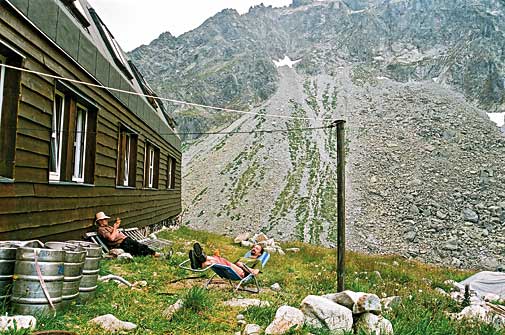
A walk in the Tatra Mountains, particularly in the summer, consists of cleverly avoiding those places that are crowded. It is not difficult, because it is easy to predict where the stream of tourists is heading: it is indicated by famous mountain refuges, by the cableways, and to some extent also by the sacred places. A badly planned excursion leading to an unexpected meeting with crowds of tourists is definitely an unpleasant experience. 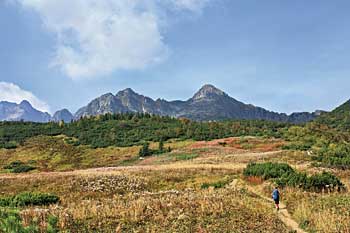 This recently happened to us in the lower Tatra Mountains. We were searching for peace and tranquility, but we already got stressed out just in the car-park because there was no space for the car. Then in the mountains we found a line of sweaty people, dogs, shouting, and plastic bottles thrown everywhere. It was only at the top of the mountain, with the afternoon well advanced, that the sun peeped out and the irritating tourists vanished. Does this mean that encounters in the mountains have lost their significance and that the people that we meet are just potential rivals in a competition for the easier side of the path or for a place on a bench at the refuge? If it was really like that, then going into the mountains would be like pursuing a career in finance or politics, but it would make no sense, because there would be no tangible gains. Unless in this instance the reward was space. So, just as in the free market the cleverest are the winners, here the victors are those who conqueor what is most lacking: space. They achieve this by, for example, knowing those paths which lead to the most hidden-away and unexplored corners of the mountains. These places are not usually marked on tourist itineraries and when you go into them you risk incurring a fine. So the intrepid winner in the free market (in the battle for space) loses against the competition on another front: the constant stress reduces the quality of his feeling of peace. Every single person he encounters is a potential guardian of nature: an enemy who could slap a fine on him. How can we talk about encounters then? What are they, and what is their significance? This recently happened to us in the lower Tatra Mountains. We were searching for peace and tranquility, but we already got stressed out just in the car-park because there was no space for the car. Then in the mountains we found a line of sweaty people, dogs, shouting, and plastic bottles thrown everywhere. It was only at the top of the mountain, with the afternoon well advanced, that the sun peeped out and the irritating tourists vanished. Does this mean that encounters in the mountains have lost their significance and that the people that we meet are just potential rivals in a competition for the easier side of the path or for a place on a bench at the refuge? If it was really like that, then going into the mountains would be like pursuing a career in finance or politics, but it would make no sense, because there would be no tangible gains. Unless in this instance the reward was space. So, just as in the free market the cleverest are the winners, here the victors are those who conqueor what is most lacking: space. They achieve this by, for example, knowing those paths which lead to the most hidden-away and unexplored corners of the mountains. These places are not usually marked on tourist itineraries and when you go into them you risk incurring a fine. So the intrepid winner in the free market (in the battle for space) loses against the competition on another front: the constant stress reduces the quality of his feeling of peace. Every single person he encounters is a potential guardian of nature: an enemy who could slap a fine on him. How can we talk about encounters then? What are they, and what is their significance?
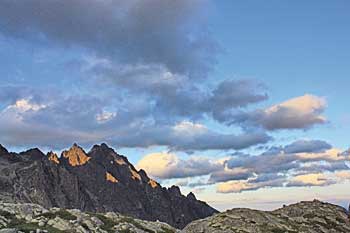 Notwithstanding the difficulties we have outlined, there are many reasons for claiming that the world of the Tatra mountains would not exist if it were not for the folk who populate them. The crowd on the one hand and the rangers on the other hand are clearly a problem, but they are not an option. When I use the word “encounters” I am thinking of something more than the unpleasant company of someone who can do you harm. Notwithstanding the difficulties we have outlined, there are many reasons for claiming that the world of the Tatra mountains would not exist if it were not for the folk who populate them. The crowd on the one hand and the rangers on the other hand are clearly a problem, but they are not an option. When I use the word “encounters” I am thinking of something more than the unpleasant company of someone who can do you harm.
Who then can we encounter in the Tatras? There are two types of people we can come up against: the first is the classic lone climber, the second is the worldly patron of the mountain bar. You can never meet a perfect version of this two types. The solitary climber avoids the refuges and bars, he gets up early and gets home late. He dresses in such a way that he does not look like a climber: his clothes get spoilt faster than you would imagine, and to the common tourist he looks more like a city-dweller.  On the other hand his colleague, the bar regular, always wears brand-new high-mountain fashions. In the summer he puts on smart, light mountain sandals and a T-shirt with a picture of an eagle or a mammoth, in winter he wears extra-heavy shoes, either brown or coloured (according to the fashion of the moment) and useful crampons to cope with the city ice. Lastly, of course, he needs Gore-Tex sweatshirts and special underwear. Nobody would ever mistake him for an occasional city tourist. Obviously, it is easier to be an orthodox climber than a master of the bar. One day in the mountains is less tiring than a night spent at the bar. And nature is kinder than people, if you are not wearing quite the right clothes. Plus the fact that the bar costs more than the mountains. On the other hand his colleague, the bar regular, always wears brand-new high-mountain fashions. In the summer he puts on smart, light mountain sandals and a T-shirt with a picture of an eagle or a mammoth, in winter he wears extra-heavy shoes, either brown or coloured (according to the fashion of the moment) and useful crampons to cope with the city ice. Lastly, of course, he needs Gore-Tex sweatshirts and special underwear. Nobody would ever mistake him for an occasional city tourist. Obviously, it is easier to be an orthodox climber than a master of the bar. One day in the mountains is less tiring than a night spent at the bar. And nature is kinder than people, if you are not wearing quite the right clothes. Plus the fact that the bar costs more than the mountains.
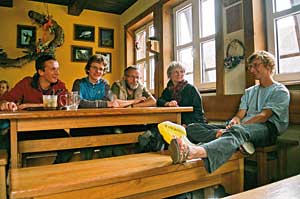 Fortunately people are not perfect: the customer at the bar sometimes ventures out into the mountains and the climber pops into the bar. Thanks to this fact, it is possible to enjoy those encounters which make up the world of the Tatras. However, one knows that to be a climber it is necessary to spend most of your time in the mountains, and to be systematic. You have to be patient and to train for a long time before you reach a sufficient level. The dedicated climber does not usually have time for futile encounters, especially at the bar. At the same time, he does need these encounters, because he needs access to other people’s knowledge and experience, and when he makes use of his own expertise, he wants to boast of his achievements. Throw him into the vortex of constant talk, and he automatically metamorphises from harsh ascetic to bar mountaineer. Fortunately people are not perfect: the customer at the bar sometimes ventures out into the mountains and the climber pops into the bar. Thanks to this fact, it is possible to enjoy those encounters which make up the world of the Tatras. However, one knows that to be a climber it is necessary to spend most of your time in the mountains, and to be systematic. You have to be patient and to train for a long time before you reach a sufficient level. The dedicated climber does not usually have time for futile encounters, especially at the bar. At the same time, he does need these encounters, because he needs access to other people’s knowledge and experience, and when he makes use of his own expertise, he wants to boast of his achievements. Throw him into the vortex of constant talk, and he automatically metamorphises from harsh ascetic to bar mountaineer. 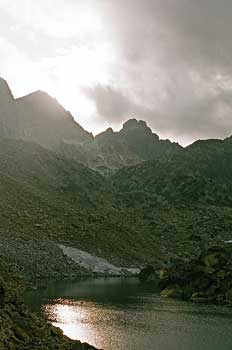 After a while he returns to the mountains and the story begins again, but now the climber can no longer hide the fact that it is these encounters that give meaning to his efforts. It is thanks to the listeners and supporters that our excursions in the Tatras begin to seem like an artistic activity. Why can this be? After a while he returns to the mountains and the story begins again, but now the climber can no longer hide the fact that it is these encounters that give meaning to his efforts. It is thanks to the listeners and supporters that our excursions in the Tatras begin to seem like an artistic activity. Why can this be?
Man is a creature living on the edge of two worlds: the material and the spiritual. The material world is represented by the need to earn money, to get things to eat etc. For some people this world is sufficient: a house, food, a car, a television. Most people, however, feel the need for something else, something that belongs to the spiritual world. And an excursion into the mountains is one of the best ways to escape the material world and approach the spiritual. We are quite capable of going without a new television or a dinner to spend a day out hiking or climbing. Obviously the mountains themselves are material and it is we who give them a spiritual value. We do not have the power to construct that metaphysical world by ourselves. To do so we need other people, we need to talk to them: we need encounters. In this way, the mountains are transformed into a spiritual realm, but this world is very fragile. It only exists in our minds, but it is independent of us. Places acquire significance, they have names and legends attached to them. Thanks to this, a space is created for people and their souls, but we must not forget that this space would not exist without contact with other people. 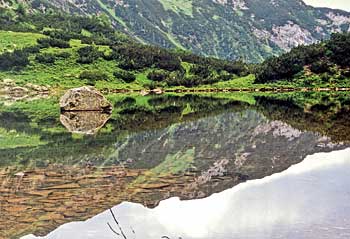 Even the classic, solitary climber constructs his own spiritual world, not only on the basis of his own experience, but also on the basis of other peoples’: he consults the guide-books and in this way, in the land of the spirit, he meets their authors. Bars play an enormous role in the creation of the mountain world and the spiritual world. We often only have time to recount our mountain adventures during encounters in the bar. Without the mountains, which do not depend on our will, our story would be released into the air. It would be as if we had nobody listening to us (which is hardly probable). This is the reason why it is encounters that make up our mountain world. Even the classic, solitary climber constructs his own spiritual world, not only on the basis of his own experience, but also on the basis of other peoples’: he consults the guide-books and in this way, in the land of the spirit, he meets their authors. Bars play an enormous role in the creation of the mountain world and the spiritual world. We often only have time to recount our mountain adventures during encounters in the bar. Without the mountains, which do not depend on our will, our story would be released into the air. It would be as if we had nobody listening to us (which is hardly probable). This is the reason why it is encounters that make up our mountain world.
|
 NUMBER 9
NUMBER 9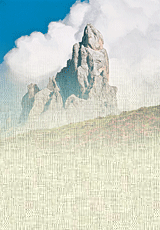
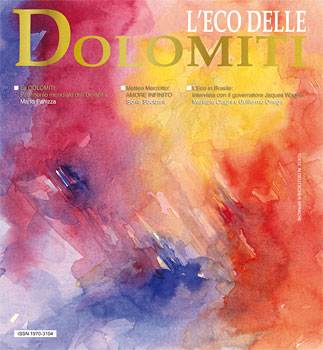

 This recently happened to us in the lower Tatra Mountains. We were searching for peace and tranquility, but we already got stressed out just in the car-park because there was no space for the car. Then in the mountains we found a line of sweaty people, dogs, shouting, and plastic bottles thrown everywhere. It was only at the top of the mountain, with the afternoon well advanced, that the sun peeped out and the irritating tourists vanished. Does this mean that encounters in the mountains have lost their significance and that the people that we meet are just potential rivals in a competition for the easier side of the path or for a place on a bench at the refuge? If it was really like that, then going into the mountains would be like pursuing a career in finance or politics, but it would make no sense, because there would be no tangible gains. Unless in this instance the reward was space. So, just as in the free market the cleverest are the winners, here the victors are those who conqueor what is most lacking: space. They achieve this by, for example, knowing those paths which lead to the most hidden-away and unexplored corners of the mountains. These places are not usually marked on tourist itineraries and when you go into them you risk incurring a fine. So the intrepid winner in the free market (in the battle for space) loses against the competition on another front: the constant stress reduces the quality of his feeling of peace. Every single person he encounters is a potential guardian of nature: an enemy who could slap a fine on him. How can we talk about encounters then? What are they, and what is their significance?
This recently happened to us in the lower Tatra Mountains. We were searching for peace and tranquility, but we already got stressed out just in the car-park because there was no space for the car. Then in the mountains we found a line of sweaty people, dogs, shouting, and plastic bottles thrown everywhere. It was only at the top of the mountain, with the afternoon well advanced, that the sun peeped out and the irritating tourists vanished. Does this mean that encounters in the mountains have lost their significance and that the people that we meet are just potential rivals in a competition for the easier side of the path or for a place on a bench at the refuge? If it was really like that, then going into the mountains would be like pursuing a career in finance or politics, but it would make no sense, because there would be no tangible gains. Unless in this instance the reward was space. So, just as in the free market the cleverest are the winners, here the victors are those who conqueor what is most lacking: space. They achieve this by, for example, knowing those paths which lead to the most hidden-away and unexplored corners of the mountains. These places are not usually marked on tourist itineraries and when you go into them you risk incurring a fine. So the intrepid winner in the free market (in the battle for space) loses against the competition on another front: the constant stress reduces the quality of his feeling of peace. Every single person he encounters is a potential guardian of nature: an enemy who could slap a fine on him. How can we talk about encounters then? What are they, and what is their significance? Notwithstanding the difficulties we have outlined, there are many reasons for claiming that the world of the Tatra mountains would not exist if it were not for the folk who populate them. The crowd on the one hand and the rangers on the other hand are clearly a problem, but they are not an option. When I use the word “encounters” I am thinking of something more than the unpleasant company of someone who can do you harm.
Notwithstanding the difficulties we have outlined, there are many reasons for claiming that the world of the Tatra mountains would not exist if it were not for the folk who populate them. The crowd on the one hand and the rangers on the other hand are clearly a problem, but they are not an option. When I use the word “encounters” I am thinking of something more than the unpleasant company of someone who can do you harm.  On the other hand his colleague, the bar regular, always wears brand-new high-mountain fashions. In the summer he puts on smart, light mountain sandals and a T-shirt with a picture of an eagle or a mammoth, in winter he wears extra-heavy shoes, either brown or coloured (according to the fashion of the moment) and useful crampons to cope with the city ice. Lastly, of course, he needs Gore-Tex sweatshirts and special underwear. Nobody would ever mistake him for an occasional city tourist. Obviously, it is easier to be an orthodox climber than a master of the bar. One day in the mountains is less tiring than a night spent at the bar. And nature is kinder than people, if you are not wearing quite the right clothes. Plus the fact that the bar costs more than the mountains.
On the other hand his colleague, the bar regular, always wears brand-new high-mountain fashions. In the summer he puts on smart, light mountain sandals and a T-shirt with a picture of an eagle or a mammoth, in winter he wears extra-heavy shoes, either brown or coloured (according to the fashion of the moment) and useful crampons to cope with the city ice. Lastly, of course, he needs Gore-Tex sweatshirts and special underwear. Nobody would ever mistake him for an occasional city tourist. Obviously, it is easier to be an orthodox climber than a master of the bar. One day in the mountains is less tiring than a night spent at the bar. And nature is kinder than people, if you are not wearing quite the right clothes. Plus the fact that the bar costs more than the mountains.  Fortunately people are not perfect: the customer at the bar sometimes ventures out into the mountains and the climber pops into the bar. Thanks to this fact, it is possible to enjoy those encounters which make up the world of the Tatras. However, one knows that to be a climber it is necessary to spend most of your time in the mountains, and to be systematic. You have to be patient and to train for a long time before you reach a sufficient level. The dedicated climber does not usually have time for futile encounters, especially at the bar. At the same time, he does need these encounters, because he needs access to other people’s knowledge and experience, and when he makes use of his own expertise, he wants to boast of his achievements. Throw him into the vortex of constant talk, and he automatically metamorphises from harsh ascetic to bar mountaineer.
Fortunately people are not perfect: the customer at the bar sometimes ventures out into the mountains and the climber pops into the bar. Thanks to this fact, it is possible to enjoy those encounters which make up the world of the Tatras. However, one knows that to be a climber it is necessary to spend most of your time in the mountains, and to be systematic. You have to be patient and to train for a long time before you reach a sufficient level. The dedicated climber does not usually have time for futile encounters, especially at the bar. At the same time, he does need these encounters, because he needs access to other people’s knowledge and experience, and when he makes use of his own expertise, he wants to boast of his achievements. Throw him into the vortex of constant talk, and he automatically metamorphises from harsh ascetic to bar mountaineer.  After a while he returns to the mountains and the story begins again, but now the climber can no longer hide the fact that it is these encounters that give meaning to his efforts. It is thanks to the listeners and supporters that our excursions in the Tatras begin to seem like an artistic activity. Why can this be?
After a while he returns to the mountains and the story begins again, but now the climber can no longer hide the fact that it is these encounters that give meaning to his efforts. It is thanks to the listeners and supporters that our excursions in the Tatras begin to seem like an artistic activity. Why can this be? Even the classic, solitary climber constructs his own spiritual world, not only on the basis of his own experience, but also on the basis of other peoples’: he consults the guide-books and in this way, in the land of the spirit, he meets their authors. Bars play an enormous role in the creation of the mountain world and the spiritual world. We often only have time to recount our mountain adventures during encounters in the bar. Without the mountains, which do not depend on our will, our story would be released into the air. It would be as if we had nobody listening to us (which is hardly probable). This is the reason why it is encounters that make up our mountain world.
Even the classic, solitary climber constructs his own spiritual world, not only on the basis of his own experience, but also on the basis of other peoples’: he consults the guide-books and in this way, in the land of the spirit, he meets their authors. Bars play an enormous role in the creation of the mountain world and the spiritual world. We often only have time to recount our mountain adventures during encounters in the bar. Without the mountains, which do not depend on our will, our story would be released into the air. It would be as if we had nobody listening to us (which is hardly probable). This is the reason why it is encounters that make up our mountain world.